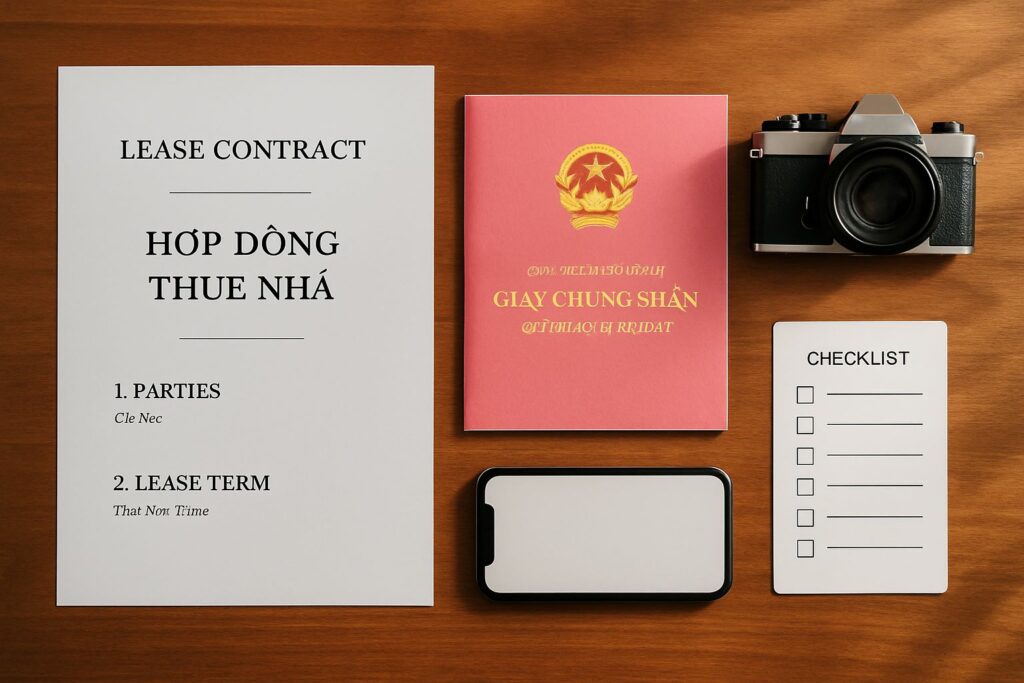How to Avoid Rent Scams in Vietnam: A Complete Guide for Expats
Moving to Vietnam is an exciting adventure. You’re looking forward to the amazing food, the vibrant culture, and finding a great place to call home. The last thing you want is for that excitement to be ruined by a bad rental experience. Finding the right apartment or house should be a highlight, not a source of stress.
Rent scams in Vietnam – Everything you should know
This guide is here to give you peace of mind. We’ll walk you through the most common rent scams in Vietnam, show you exactly how to spot them, and give you a clear, actionable checklist to rent safely. With a little knowledge, you can confidently navigate the rental market and avoid any potential pitfalls. Protecting yourself from rental scams in Vietnam is the first and most important step to settling into your new life here.
Are Rental Scams in Vietnam a Big Problem?
Yes, unfortunately, rent scams in Vietnam are common, especially for foreigners who may not be familiar with the local laws, language, and business practices. Scammers often target newcomers because they see an opportunity. However, it’s important to understand that while these scams exist, they are almost entirely avoidable with the right information and approach. The goal of this guide is to arm you with that information so you can rent with confidence.
Does Da Nang Have Fewer Scams Than Hanoi or Ho Chi Minh City?
Generally speaking, Da Nang has fewer scams than bigger cities. Mostly due to the sheer volume of rental transactions, which is much higher in massive urban centers like Hanoi and Ho Chi Minh City, so you will naturally find a higher number of reported rent scams in Vietnam there.
Da Nang, being a smaller city, has a more tight-knit community, especially among expats. Word travels fast, and reputations matter. However, this does not make it immune to scams. The types of scams might be less aggressive, but they still exist. No matter where you are in Vietnam, the core principles of how to avoid getting scammed remain the same.
What Are the Common Scams When Renting a House in Vietnam?
Property scammers in Vietnam are often predictable and use the same tactics repeatedly. Here are the most common rental scams in Vietnam that you need to be aware of.
1. The Fake Listing & The Bait-and-Switch
- How it Works: You see a beautiful apartment online for an incredibly low price. The photos are professional, and the description is perfect. When you contact the “agent” or “landlord,” they tell you that specific property was just rented. However, they have another, “similar” property they can show you. Inevitably, this second property is more expensive, in a worse location, or in poorer condition. The original listing was just a “bait” to lure you in.
- How to Spot It: The number one red flag is a price that seems too good to be true. If a stunning beachfront villa is listed for the price of a small city apartment, it’s almost certainly a fake listing designed to capture your contact details.
- Mentions: However, since most agents don’t hold exclusive listings with landlords, it’s difficult to keep online property listings updated. This often leads to frustration, as many properties shown online are no longer available. It’s not done with bad intent — it’s simply how the market works.
2. The Disappearing Deposit Scam
- How it Works: This is one of the most frequent rent scams in Vietnam. You find a place you love, and the “landlord” asks for a deposit to “hold” the property for you. They may create a sense of urgency, telling you other people are interested. Once you transfer the money, they disappear. Their phone number is disconnected, their social media profile is deleted, and you have no way to get your money back.
- How to Spot It: The scammer will resist signing a formal “Deposit Agreement” and will push for a quick bank transfer or cash payment without providing a proper, signed receipt. They will also likely be unable to provide official ownership documents for the property. Make sure you always visit the property and sign the deposit agreement on the spot (or in the apartment).
3. The Inflated Utility Bill Scam
- How it Works: This scam happens after you’ve moved in. Your rental contract might state that you pay for utilities “as per the government rate,” but the landlord presents you with a bill that is far higher than your actual usage. They might be using a non-standard meter, making up the numbers, or simply adding a huge “service fee” on top of the real bill.
- How to Not Get Scammed by Your Landlord in Vietnam in this scenario: Before signing the lease, insist on seeing a few previous utility bills for the property to understand the typical costs. Your contract should clearly state that electricity and water are to be paid according to the official government provider’s bill, which you have a right to see.
4. The “Agent” Who Isn’t an Agent
- How it Works: You connect with someone on a Facebook group or social media platform who claims to be a real estate agent. They show you properties, but they aren’t affiliated with any registered company. They are simply a “freelancer” acting as a middleman. They might charge you a “viewing fee” or, worse, take your deposit and disappear. They have no license, no office, and no accountability.
- How to Avoid Getting Scammed by Real Estate Agents: Always work with a reputable, registered real estate agency. A professional agency will have a physical office, a company website, and licensed agents who do not charge you fees for viewings. An agency like MVP Vietnam, for example, has a long-standing reputation and a physical presence in the market.
5. The Vague or Unfair Contract Clause
- How it Works: The rental contract is presented to you, often only in Vietnamese. You’re assured it’s “standard,” but it contains hidden clauses. These might include unreasonable terms for breaking the lease, clauses that allow the landlord to withhold your entire deposit for minor wear and tear, or terms that permit them to increase the rent with minimal notice.
- How to Spot It: A legitimate landlord or agent will be happy to provide a bilingual contract and give you time to review it. They will not rush you into signing. If you feel pressured, or if they are unwilling to clarify clauses, walk away.
- Mentions: However, sometimes the market is quite hot as Da Nang is fast growing as a destination for digital nomads, expats and tourists. Good deals and properties are quickly gone, so quick decisions (not rushed) could be helpful to lock in the deal.
How to Avoid Scams When Renting: Your Action Plan

Now that you know what to look for, here is your step-by-step guide on how to avoid scams when renting. Following these rules will protect you from over 99% of potential rent scams in Vietnam.
1. Always See the Property in Person
This is the golden rule. Never, under any circumstances, pay a deposit for a property you have not physically visited and inspected. Photos can be old, misleading, or stolen from another listing. A personal visit confirms the property is real and allows you to check its actual condition.
2. Verify the Landlord’s Identity and Ownership
Before any money changes hands, you have the right to verify that the person you’re dealing with is the actual owner or has the legal right to rent the property.
- Ask for the “Pink Book” (Sổ Hồng): This is the official land and house ownership certificate in Vietnam. The name on this document should match the name on the landlord’s ID card and the rental contract.
- If Dealing with an Agent: The agent should be able to provide you with a copy of these documents from the landlord.
3. Insist on a Bilingual Contract and Understand It
A professional rental agreement should always be bilingual (Vietnamese and English). This ensures both parties understand their rights and obligations. Key things to check in the contract:
- Deposit Clause: How and when will your deposit be returned? What are the specific conditions for deductions?
- Termination Clause: What is the procedure if you or the landlord need to end the lease early?
- Responsibilities: Who is responsible for repairs (e.g., air conditioning, plumbing)?
- Utility Payments: It should explicitly state that utilities are paid according to official government bills or an agreed rate.
4. Document Everything
- Take Photos/Videos: Before you move in, take detailed photos and videos of the property’s condition, paying close attention to any existing damage, like scratches on the floor or marks on the walls. Share this with the landlord via email or Zalo so you have a time-stamped record. This is your best protection against unfair deposit deductions when you move out.
- Keep Communication Records: Keep all your conversations with the landlord and agent, especially regarding payments, repairs, and agreements.
5. Be Smart About Payments
- Tiền gửi: Only pay the deposit upon signing a “Deposit Agreement” or the final Lease Agreement. Never before.
- Receipts: Always get a signed receipt for every single payment you make, whether it’s cash or a bank transfer.
- Bank Transfers: When paying via bank transfer, ensure the recipient’s name matches the name on the ownership documents and the contract.
How to Avoid Getting Scammed by Real Estate Agents
A good real estate agent is your best ally in the rental process. A bad one can be a significant risk.
- What a Good Agent Does: A professional agent works for you. They listen to your needs, provide a curated list of suitable properties, accompany you on viewings, and help you negotiate the contract.
- Red Flags for a Bad Agent:
- They have no company name, no office, and only operate via a personal social media account.
- They pressure you to make a quick decision.
- They are hesitant to provide ownership documents for verification.
The safest approach on how to avoid getting scammed by real estate agents is to choose an agency with a long, public track record and a professional website. A company like MVP Vietnam, with 6 years of experience in the Da Nang market, offers a level of accountability that individual freelancers cannot.
MVP Vietnam has also been featured in Vietnam Done Right, as one of the top commercial property agents:

Final Checklist to Avoid Rent Scams in Vietnam

Before you sign any lease, run through this final checklist. If you can tick every box, you are in a very safe position.
- I have visited the property in person.
- I have verified the landlord’s identity and ownership documents (“Pink Book”).
- I have a clear, bilingual rental contract.
- I understand all the clauses in the contract, especially regarding the deposit.
- I have documented the property’s condition with photos/videos.
- I will only pay the deposit upon signing the contract.
- I will get a signed receipt for my deposit payment.
- I am working with a reputable and registered real estate agency.
While the threat of rent scams in Vietnam is real, it should not discourage you. Millions of expats live happily in rented accommodation across the country. By being informed, asking the right questions, and following a logical process, you can ensure your rental experience is safe, secure, and the start of a wonderful chapter in your life in Vietnam.
This guide is meant to be informational and help guide you through a, potentially, scary, and stressful step when moving to a new country or a new city. Being aware of and avoiding these rent scams in Vietnam can save you time, money, and a headache, making your experience a more pleasant one.
If you have additional questions or need help finding an apartment or a house in Da Nang or Hoi An, you can liên hệ với chúng tôi. Our experienced agents can guide you through a safe and successful rental process.

